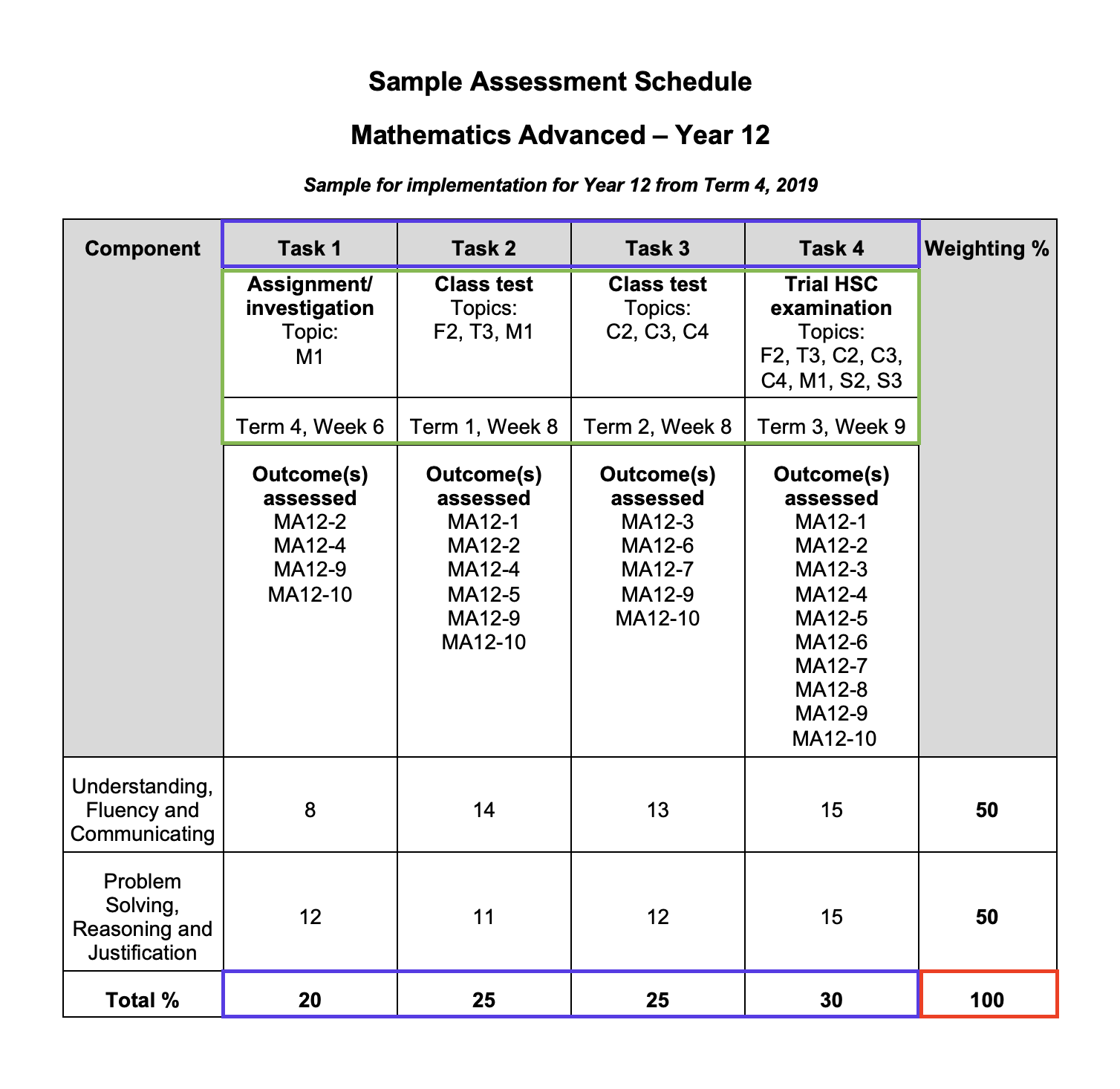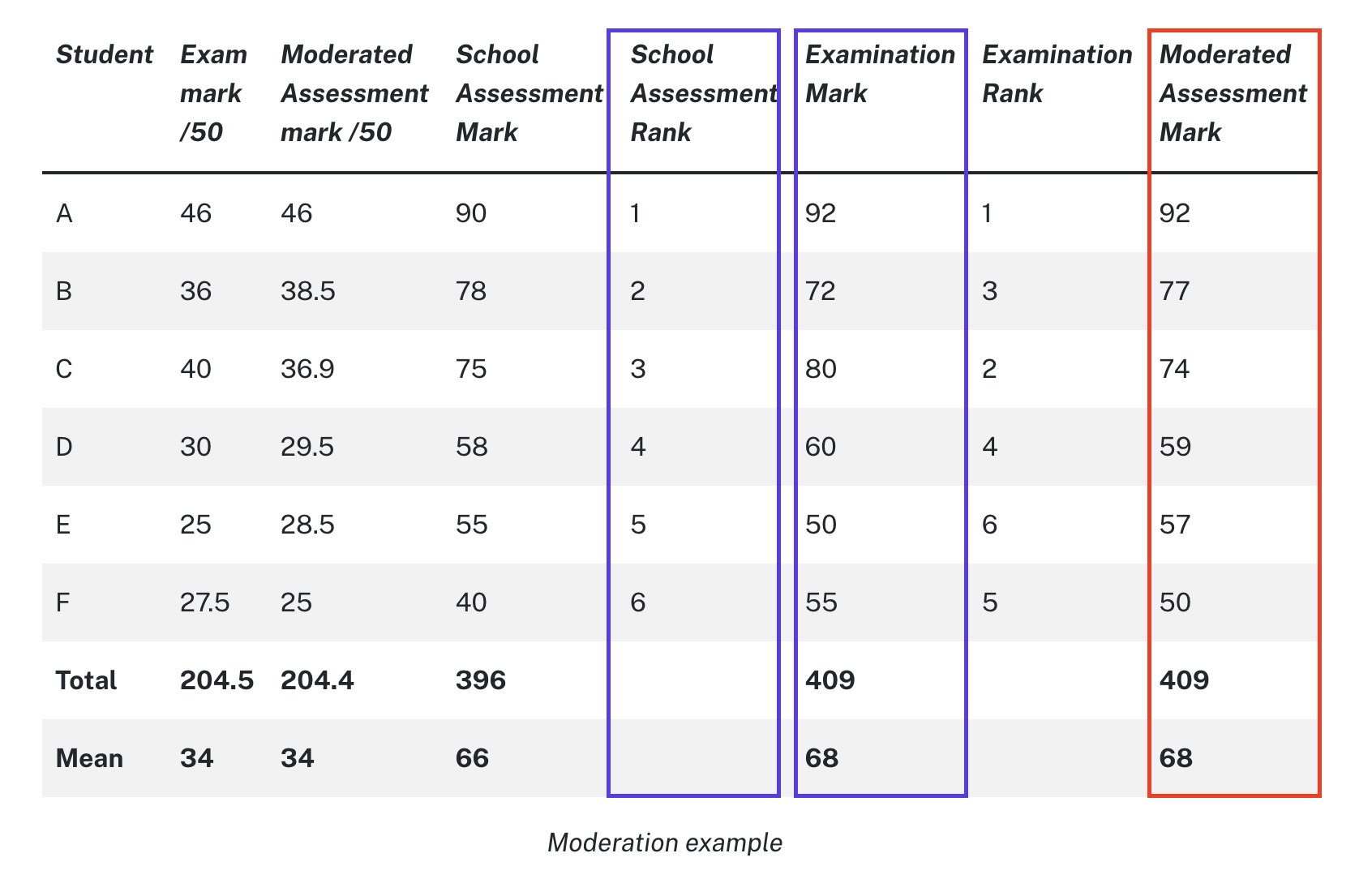WHY STARTING EARLY IN YEAR 12 MATTERS: Understanding HSC Assessment Moderation
When it comes to the HSC, your final results aren’t just about the school you attend—whether it’s a local, selective, or private school. What truly matters is your Year 12 cohort and the distribution of marks between ranks in each course in your school. Understanding how HSC assessment moderation works is key to making the most of your Year 12 journey, and it highlights why starting early can make all the difference
What Makes Up HSC Marks For Each Subject?

In the HSC (Higher School Certificate), your final mark for each course is a combination of two key components:

Examination Mark
This is the mark you achieve in the external HSC examination.

Assessment Mark
This reflects your performance in internal assessments, such as assignments, tests, and projects, which are moderated against your cohort’s performance in the HSC exams.
HSC Mark
The final HSC Mark is calculated as the average of these two components. For instance, if your school-based mark is 85 and your HSC exam mark is 87, your final HSC mark will be 86 (rounded to the nearest whole number).
Performance Band
Your HSC Marks determines which Performance Band (from Band 1 to Band 6) you fall into for each course:
- Band 6: 90-100 (highest level of achievement)
- Band 5: 80-89
- Band 4: 70-79
- Band 3: 60-69
- Band 2: 50-59
- Band 1: Below 50
These bands represent your level of understanding and achievement for that subject, with Band 6 indicating mastery of the course content and skills.
Assessment Marks for Each Subjects
Since school-based assessments contribute 50% of your final HSC mark (with the other 50% coming from the HSC exam), consistent effort throughout the year is key and staying on top of your assessment schedule from the start can make a big difference.
Each subject has a unique assessment schedule designed by the school following NESA guidelines. These schedules ensure students are tested in varied ways, such as:
✅ Assignments & Investigations
✅ In-Class Tests
✅ Practical Assessments
✅ Major Projects & Presentations
✅ Trial HSC Exams
All tasks together add up to 100% of your school-based mark, which determines your rank within the school. Since NESA moderates school assessments, your rank plays a crucial role in final HSC results.

The image above is a sample assessment schedule for Mathematics Advanced – Year 12. While each subject has its own unique schedule, this example highlights how assessments are structured throughout the year.
At the start of Year 12, students receive an assessment schedule for each subject. This document is essential for planning and outlines key details, including:
📌 Task Types – Each subject has different types of assessments (e.g., assignments, class tests, practicals, major projects).
📌 Assessment Dates – Assessments are scheduled throughout the year. Students receive an Assessment Notification at least two weeks before each task, detailing requirements and marking criteria. Mark these in a planner and start preparing early.
📌 Outcomes Assessed – Each task is linked to specific learning outcomes, ensuring students develop a broad range of skills.
📌 Weightings – Every task contributes a percentage toward the final school-based mark, adding up to 100% by the end of the year. Some tasks carry more weight than others, so prioritise study accordingly.
Since assessment schedules vary across schools, students should refer to their school’s official assessment guidelines and plan accordingly.
What Is HSC Assessment Moderation?
HSC assessment moderation ensures fairness in the final marks by aligning your school-based assessment results with your school’s HSC exam performance. This allows students from all schools—local, selective, or private—to be fairly compared on a state-wide scale.
https://youtu.be/BlvHCxWHnXs


School-based Assessments:
During the year, your internal school assessments (such as exams, essays, and assignments) determine your rank within your school for each subject.

HSC Exams:
At the end of the year, you sit for the HSC exams, which are marked externally by NESA examiners.

Moderation:
NESA uses your school’s overall HSC exam performance to adjust (moderate) your school-based assessment marks. Your rank within the cohort determines how much of your moderated assessment mark reflects the top, middle, or lower HSC exam scores achieved by your peers.
It’s About Your Cohort, Not the School
Whether you attend a selective, private, or local school, what matters most is your cohort’s performance and the distribution of marks between ranks in the course in your school. Here’s how it plays out:
SELECTIVE SCHOOL EXAMPLE
In selective schools, students tend to perform at a similar high level. This means the gap between ranks is often very small.
For example: If the top HSC exam score in a subject is 95, the internal ranks might be distributed like this:
- Rank 1: Moderated internal mark = 95
- Rank 2: Moderated internal mark = 94
- Rank 10: Moderated internal mark = 92
Because the cohort performs consistently, your rank has a smaller impact on your final mark. -
LOCAL SCHOOL EXAMPLE
In local schools, there’s often a wider gap between the top and lower performers.
For example: If the top HSC exam score in a subject is 90, the internal ranks might be distributed like this:
- Rank 1: Moderated internal mark = 90
- Rank 2: Moderated internal mark = 85
- Rank 10: Moderated internal mark = 75
In this case, your rank has a much greater impact on your final moderated mark because the gap between scores is larger. -
PRIVATE SCHOOL EXAMPLE
Private schools can fall anywhere in between, depending on the strength and consistency of the cohort. Some private schools perform similarly to selective schools, while others may resemble local schools in terms of performance gaps.
Understanding How Your ATAR is Calculated
Key Factors That Contribute to Your ATAR
-
-
- HSC Marks & Scaling – Your ATAR is derived from your scaled HSC marks, not your raw marks. Some subjects scale higher than others, depending on how students in that course perform overall.
- Best 10 Units – Your ATAR calculation is based on your best 10 units, including:
-
- English (mandatory 2 units)
- Your next highest 8 units, which can include any mix of Board-developed subjects.
-
- School-Based Assessments & Exam Performance – Your final HSC mark consists of 50% school-based assessments and 50% HSC exam marks. Your assessment rank within your school matters, as marks are moderated by NESA to ensure fairness across different schools.
- Assessment Weightings & Rank Moderation – Your school assessment schedule (like the sample we discussed) plays a critical role in determining your final rank. Since school assessments are moderated against HSC performance, consistent performance throughout the year is crucial.
- Course Selection & Scaling Impact – Subjects scale differently based on student performance. High-scaling subjects (like Mathematics Advanced, Mathematics Extension, and Physics) may contribute more favourably to your ATAR if you perform well in them. However, choosing subjects based on your strengths is more important than just picking high-scaling ones.
-
For more details on ATAR calculation, visit:
🔗 UAC – How Your ATAR is Calculated
Key Takeaways
- Your final HSC results depend on your cohort’s performance and the distribution of marks, not just the type of school you attend.
- Your school-based assessments contribute 50% of your HSC marks, and these marks are ranked and moderated
- In schools with wide performance gaps, your rank can significantly impact your moderated mark.
- By planning ahead using your assessment schedule, managing time effectively, and prioritising high-weighted tasks, you can maximise your ATAR potential.
- Starting early helps you build strong study habits, perform consistently in assessments, and secure a competitive rank regardless of your school or cohort.
- ATAR is not a score, its a ranks against NSW Year 12 cohort, taking into many factors such as rank, subjects and what you score in each HSC Course
Your ATAR & HSC rewards both effort and strategy. Start early, stay consistent, stay organise, be proactive and set yourself up for success! 🚀
Questions you should consider
What ATAR are you aiming?
Consider the scaling of the subject you have chosen and what score you may have to score for each subject.
What is your cohort performance gap for each subject? https://www.uac.edu.au/atar-compass/
Where do you sit for each subject at the moment?
Where do you want to be for each subject?
What steps do your need to take to reach your goal for each subject?
